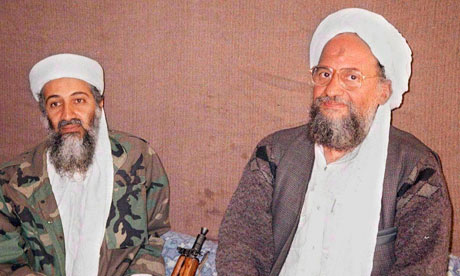Ayman al-Zawahiri: new al-Qaida leader won't command instant loyalty
Egyptian was logical successor to Osama bin Laden but may struggle to win over his own ranks and wider Islamic world
=================================================

Jason Burke, guardian.co.uk, Thursday 16 June 2011 13.08 BST

A photograph from November 2001 of Osama bin Laden and
Egyptian was logical successor to Osama bin Laden but may struggle to win over his own ranks and wider Islamic world
=================================================

Jason Burke, guardian.co.uk, Thursday 16 June 2011 13.08 BST

A photograph from November 2001 of Osama bin Laden and
Ayman al-Zawahiri. Photograph: Ausaf Newspaper/EPA
=================================================
What is the significance of Ayman al-Zawahiri's apparent succession to the head of al-Qaida?
It is tempting to answer "not a lot". The real seismic change in al-Qaida's evolution is the loss of the charismatic and extraordinarily well-knownOsama bin Laden. After such an event the choice of successor is relatively trivial.
But there are various points to be made.
Firstly, the fact that Zawahiri has taken charge shows that the internal structures of the organisation founded in Peshawar, Pakistan, in 1988 are still functioning. Zawahiri is an Egyptian veteran militant who had been Bin Laden's close associate for nearly 20 years and the obvious contender to take over.
We don't have the details but the appointment of Zawahiri must have been approved by a shura, or council, of senior militants. They may have met but it would have been extremely dangerous and is unlikely. They may have used some other less perilous way of consulting or at least making their voices heard. Either way, the system appears to have worked. The core al-Qaida group may splinter in the coming years – it almost certainly will – but not just yet.
Secondly, the appointment of Zawahiri shows the continuing importance to the central leadership of al-Qaida of their various regional affiliates. Particularly with Bin Laden gone, the hard core of 30 or 40 senior militants, in all probability confined to western Pakistan, need al-Qaida's scattered "network of networks" more than ever. Indeed, they need groups in Iraq, Yemen and elsewhere more than the affiliate groups need them. Several of these various "franchises" came out in favour of Zawahiri as al-Qaida emir very soon after the death of their leader. The choice of Zawahiri over younger figures, such as the Egyptian Saif al-Adel or the Libyan Atiyah Abd al-Rahman (believed to be based in Pakistan), in part reflects their increased influence at the centre.
Thirdly, Zawahiri's appointment is unlikely to do much to boost al-Qaida's negligible popular support in the Islamic world. He is old – 60 this Sunday – which won't help in an Arab world where the authority of older generations is being questioned as never before. He is Egyptian, which could exacerbate existing splits between Libyan and other factions and those from his homeland within the leadership. He is irascible and argumentative, which won't help bring in new recruits – or endear him to old ones.
You cannot swear allegiance to al-Qaida the organisation: the oath, or bayat, is to an individual only. This means the personal loyalty of followers of Bin Laden does not transfer automatically to Zawahiri. For aspirant jihadis, whether in Jeddah or Manchester or Lahore, being a follower of Zawahiri is a much less attractive proposition than being a follower of Bin Laden.
Zawahiri is experienced, even if he lacks the legend and notoriety of Bin Laden. He was tortured by Egyptian security in the early 1980s after the assassination of President Sadat. He is known to be relatively pragmatic. Any new strategy will probably seek to find al-Qaida some kind of role in the current changes in the Arab and Islamic world. The accompanying propaganda will insist that what has occurred so far is a step in the right direction but that for the journey to be finished, different and violent tactics are needed.
Zawahiri will thus have to try to counter or at least obscure al-Qaida's reputation for indiscriminate killing and the murder of fellow Muslims. Given the atrocities of recent years this will not be easy. It is unlikely that Zawahiri is the man to bring the organisation he now leads back from the geographic, ideological, cultural and social margins of the Islamic world – even if he can stay alive long enough to try.
=================================================
What is the significance of Ayman al-Zawahiri's apparent succession to the head of al-Qaida?
It is tempting to answer "not a lot". The real seismic change in al-Qaida's evolution is the loss of the charismatic and extraordinarily well-knownOsama bin Laden. After such an event the choice of successor is relatively trivial.
But there are various points to be made.
Firstly, the fact that Zawahiri has taken charge shows that the internal structures of the organisation founded in Peshawar, Pakistan, in 1988 are still functioning. Zawahiri is an Egyptian veteran militant who had been Bin Laden's close associate for nearly 20 years and the obvious contender to take over.
We don't have the details but the appointment of Zawahiri must have been approved by a shura, or council, of senior militants. They may have met but it would have been extremely dangerous and is unlikely. They may have used some other less perilous way of consulting or at least making their voices heard. Either way, the system appears to have worked. The core al-Qaida group may splinter in the coming years – it almost certainly will – but not just yet.
Secondly, the appointment of Zawahiri shows the continuing importance to the central leadership of al-Qaida of their various regional affiliates. Particularly with Bin Laden gone, the hard core of 30 or 40 senior militants, in all probability confined to western Pakistan, need al-Qaida's scattered "network of networks" more than ever. Indeed, they need groups in Iraq, Yemen and elsewhere more than the affiliate groups need them. Several of these various "franchises" came out in favour of Zawahiri as al-Qaida emir very soon after the death of their leader. The choice of Zawahiri over younger figures, such as the Egyptian Saif al-Adel or the Libyan Atiyah Abd al-Rahman (believed to be based in Pakistan), in part reflects their increased influence at the centre.
Thirdly, Zawahiri's appointment is unlikely to do much to boost al-Qaida's negligible popular support in the Islamic world. He is old – 60 this Sunday – which won't help in an Arab world where the authority of older generations is being questioned as never before. He is Egyptian, which could exacerbate existing splits between Libyan and other factions and those from his homeland within the leadership. He is irascible and argumentative, which won't help bring in new recruits – or endear him to old ones.
You cannot swear allegiance to al-Qaida the organisation: the oath, or bayat, is to an individual only. This means the personal loyalty of followers of Bin Laden does not transfer automatically to Zawahiri. For aspirant jihadis, whether in Jeddah or Manchester or Lahore, being a follower of Zawahiri is a much less attractive proposition than being a follower of Bin Laden.
Zawahiri is experienced, even if he lacks the legend and notoriety of Bin Laden. He was tortured by Egyptian security in the early 1980s after the assassination of President Sadat. He is known to be relatively pragmatic. Any new strategy will probably seek to find al-Qaida some kind of role in the current changes in the Arab and Islamic world. The accompanying propaganda will insist that what has occurred so far is a step in the right direction but that for the journey to be finished, different and violent tactics are needed.
Zawahiri will thus have to try to counter or at least obscure al-Qaida's reputation for indiscriminate killing and the murder of fellow Muslims. Given the atrocities of recent years this will not be easy. It is unlikely that Zawahiri is the man to bring the organisation he now leads back from the geographic, ideological, cultural and social margins of the Islamic world – even if he can stay alive long enough to try.
=================================================
.guardian.co.uk/world/2011/jun/16/ayman-al-zawahiri-alqaida-leader
No comments:
Post a Comment